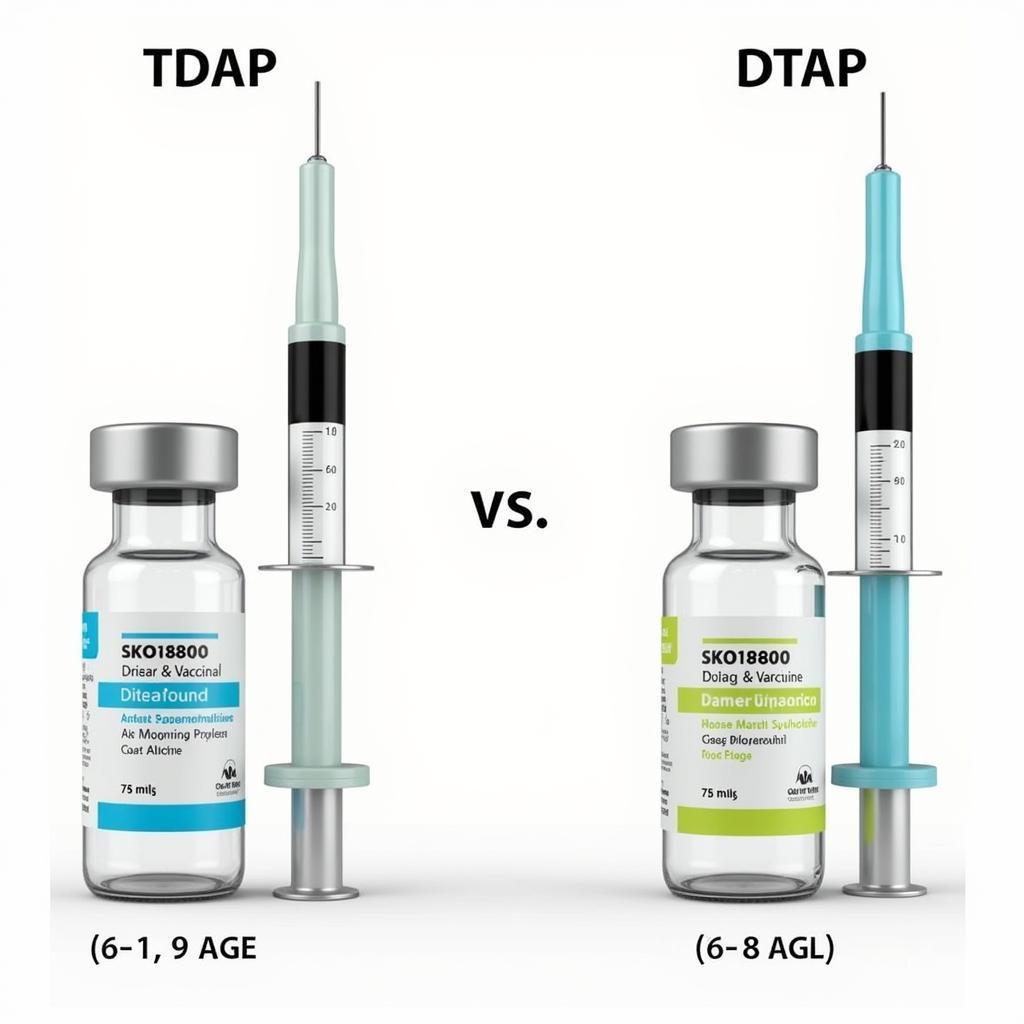TDAP vs. DTap vaccines are essential for protecting against tetanus, diphtheria, and pertussis (whooping cough). Understanding the differences between these two vaccines is crucial for ensuring you and your family receive the appropriate protection. This article will delve into the specifics of each vaccine, who should receive them, and why they are so important.
Decoding the Acronyms: TDAP and DTap
TDAP and DTap, while seemingly similar, cater to different age groups and offer varying levels of protection. DTaP is designed for children under seven years old, providing a higher dose of the diphtheria and pertussis components. TDAP, on the other hand, is administered to adolescents and adults, offering a lower dose of these components to minimize potential side effects while still ensuring adequate immunity.
Why are Boosters Necessary?
Immunity from childhood vaccinations, like DTaP, wanes over time, making booster shots, like TDAP, crucial for maintaining protection throughout adulthood. This is especially important for pregnant women, as a TDAP booster during pregnancy protects both the mother and the newborn from pertussis.
 So sánh vắc-xin TDAP và DTaP
So sánh vắc-xin TDAP và DTaP
TDAP Vaccine: Protecting Adolescents and Adults
The TDAP vaccine is recommended for adolescents starting at age 11, followed by booster doses every ten years. This vaccine is vital for protecting against tetanus, diphtheria, and pertussis, diseases that can have serious, even life-threatening, consequences.
Who Should Get the TDAP Vaccine?
- Adolescents aged 11-12 years old
- Pregnant women during each pregnancy, ideally between 27 and 36 weeks
- Adults who have never received a TDAP vaccine
- Adults needing a booster dose every ten years
DTaP Vaccine: Safeguarding Young Children
The DTaP vaccine is a five-dose series given to children at 2, 4, 6, and 15-18 months of age, with a final dose between 4 and 6 years old. This vaccination schedule ensures children develop robust immunity against these potentially devastating diseases during their most vulnerable years.
The Importance of DTaP Vaccination
DTaP vaccination is crucial for protecting young children from whooping cough, which can be particularly dangerous for infants. The vaccine also safeguards against tetanus and diphtheria, diseases that can cause severe complications and even death.
Side Effects: What to Expect
Both TDAP and DTap vaccines can cause mild side effects, such as pain, redness, or swelling at the injection site, low-grade fever, and fatigue. These side effects are typically temporary and resolve within a few days. Serious side effects are rare.
TDAP vs. DTaP: A Summary Comparison
| Feature | TDAP | DTaP |
|---|---|---|
| Age Group | Adolescents & Adults | Children under 7 |
| Dosage | Lower diphtheria & pertussis | Higher diphtheria & pertussis |
| Schedule | Booster every 10 years | 5 doses in childhood |
| Purpose | Maintain immunity | Develop initial immunity |
Conclusion: Protecting Yourself and Your Loved Ones with TDAP and DTaP
Both TDAP and DTap vaccines are vital for protecting against tetanus, diphtheria, and pertussis. Understanding the differences between these vaccines allows you to make informed decisions about your health and the health of your family. Talk to your healthcare provider to ensure you are up-to-date on your vaccinations and receive the appropriate protection against these potentially serious diseases.
FAQ: Common Questions about TDAP and DTaP Vaccines
-
What is the difference between TDAP and DTap? TDAP is for adolescents and adults, while DTaP is for children under seven. The dosages of diphtheria and pertussis components also differ.
-
Why is it important to get vaccinated? Vaccination protects against potentially life-threatening diseases like tetanus, diphtheria, and pertussis.
-
Are there any side effects? Mild side effects are common, such as injection site pain and fever. Serious side effects are rare.
-
When should I get vaccinated? Talk to your doctor to determine the appropriate vaccination schedule for you and your family.
-
Where can I get vaccinated? Vaccines are available through healthcare providers, pharmacies, and public health clinics.
-
How long does immunity last? Immunity wanes over time, which is why booster shots are necessary.
-
Is the TDAP vaccine safe during pregnancy? Yes, it’s recommended for pregnant women to protect both the mother and newborn.
Mô tả các tình huống thường gặp câu hỏi.
Một số phụ huynh lo lắng về tác dụng phụ của vắc-xin. Điều quan trọng là phải thảo luận những lo ngại này với bác sĩ để hiểu rõ hơn về lợi ích và rủi ro của việc tiêm chủng.
Gợi ý các câu hỏi khác, bài viết khác có trong web.
- Vắc-xin phòng bệnh nào khác được khuyến nghị cho trẻ em và người lớn?
- Làm thế nào để tìm nhà cung cấp dịch vụ chăm sóc sức khỏe gần tôi để được tiêm chủng?